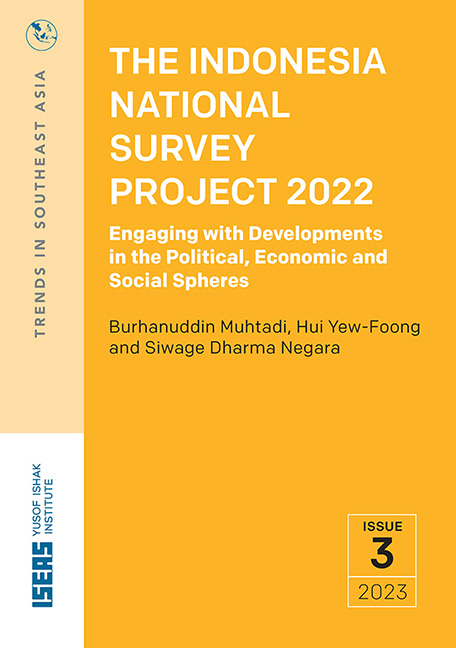 The Indonesia National Survey Project 2022
The Indonesia National Survey Project 2022 Book contents
- Frontmatter
- Foreword
- Table of Contents
- List of Figures and Tables
- The Indonesia National Survey Project 2022: Engaging with Developments in the Political, Economic and Social Spheres: Executive Summary
- 1 The Indonesia National Survey Project 2022: Engaging with Developments in the Political, Economic and Social Spheres: Introduction
- 2 Politics
- 3 Economy
- 4 International Relations
- 5 Society
- 6 Current Issues
- 7 Conclusion
4 - International Relations
Published online by Cambridge University Press: 09 January 2024
- Frontmatter
- Foreword
- Table of Contents
- List of Figures and Tables
- The Indonesia National Survey Project 2022: Engaging with Developments in the Political, Economic and Social Spheres: Executive Summary
- 1 The Indonesia National Survey Project 2022: Engaging with Developments in the Political, Economic and Social Spheres: Introduction
- 2 Politics
- 3 Economy
- 4 International Relations
- 5 Society
- 6 Current Issues
- 7 Conclusion
Summary
Perceptions of Foreign Countries and ASEAN
Following the INSP2017, the INSP2022 also surveys Indonesians’ perceptions of other countries. However, considering the geopolitical situation and recent trends, the list of foreign countries/regions has been updated to include Saudi Arabia, Turkey, Russia, European Union (EU), South Korea, India, and Vietnam (replacing Thailand). Regarding countries that respondents admire, Figure 18 shows that Muslim countries—Saudi Arabia (95.7 per cent) and Turkey (90.1 per cent)—top the list. With the addition of the Muslim countries, Singapore (89.1 per cent) is relegated to third place from first in 2017. In view of the ongoing armed conflict in Europe, it is notable that Russia (86.8 per cent) is more admired than the US (81.8 per cent) and EU (86.5 per cent). Among the reasons why Indonesians admire Russia more than the United States and European Union are anti-American and anti-Western sentiments, based on the perception that America and the West have treated Muslims unfairly, as evidenced in their foreign policy in the Middle East and with regard to the Israeli-Palestinian conflict. In contrast, Russia is viewed as more Muslim-friendly. As with the INSP2017, China (78.2 per cent) remains the least admired by respondents. In considering religion as a variable influencing respondents’ admiration for Muslim-majority countries, we find that there is no significant difference in the cases of Turkey and Malaysia. However, regarding Saudi Arabia, Muslims are more likely to express admiration (96.2 per cent) than non-Muslims/others (90.2 per cent).
Respondents are also asked which countries are important for Indonesia. In this regard, Saudi Arabia, Singapore, Turkey and Japan are more likely to be considered important countries for Indonesia. Interestingly, ASEAN is considered less important than the EU but more important than the US, China and India.
China’s Impacts
In the context of the global rise of China, respondents are asked if they think the rise of China will have a positive or negative impact on neighbouring countries such as Indonesia. While the INSP2017 shows that those who think the rise of China will have a positive impact on Indonesia (41 per cent) are slightly more than those who think it will have a negative impact (39 per cent), the INSP2022 finds a reversal in the trend, wherein respondents who perceive a negative impact (34.1 per cent) exceed those who perceive a positive one (27.1 per cent) (Figure 19).
- Type
- Chapter
- Information
- The Indonesia National Survey Project 2022Engaging with Developments in the Political, Economic and Social Spheres, pp. 33 - 39Publisher: ISEAS–Yusof Ishak InstitutePrint publication year: 2023
